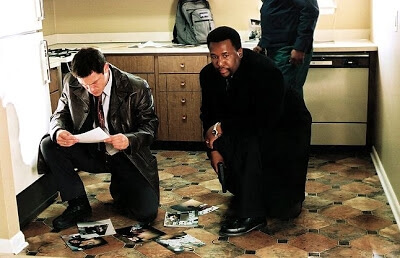As of today, Jonathan Abrams’ highly anticipated oral history of one of TV’s most lauded series, HBO’s The Wire, is now available. We were big fans of it, but if you’d like a little taste of the book before scooping it up, Vulture has published an excerpt chronicling one of the series’ most memorable scenes. That scene, for anyone who’s seen the series, can be summarized with one word: Fuck.
Fairly early in season one, detectives Jimmy McNulty (Dominic West) and Bunk Moreland (Wendell Pierce) are investigating the cold, unsolved murder of a young woman in the hopes of getting closer to drug kingpin Avon Barksdale. As they sort through the piss-poor work of the detective who originally investigated the crime, the pair come upon a series of new clues that help them make sense of what really happened. One might think a scene such as that would require a great amount of hand-holding, the pair breaking down each new discovery. Instead, creator David Simon had the duo utter nothing but variations of the word “fuck” throughout the scene.
As the excerpt outlines, the “fuck” conceit was inspired by Detective Terry McLarney, who Simon chronicled in his book, Homicide: A Year on the Killing Streets. According to Simon, McLarney once joked that “[one] day we’re going to get to the point where we’re all going to be able to just use the word fuck to communicate.” On its surface, it all might sound simplistic, but that combination of pathos, humor, and trust in both the audience and the performers serves as a microcosm of everything that made The Wire such a special show.
Also, Pierce asserts that the scene features some of his best acting. He also reveals that there are even more fucks scattered across the cutting room floor.
WENDELL PIERCE (DET. WILLIAM “BUNK” MORELAND):I think it’s an example of one of the best displays of my acting in the whole series. I tell folks, “Study that if you want to study what intent is,” because everyone understood exactly what we were doing at every moment, even though we were using just that one word or [a] variation thereof. That was one of the best-acted scenes that I did on the show. The one thing they cut out that I regret is we said, “Fuck. Fuck me. Mother fuck. Fuckity fuck,” all of that. Then we were [being] watched the whole time by the super. “Fuck. Motherfucker. Fuck.” We go outside and we find the casing, and the super says, “Well, I’ll be fucked.” They cut that out, though. I was like, “Oh, man, they should have left that in.”
Not everybody loved the idea, however. Part of what makes The Wire’s look into crime, economic disparity, and systemic oppression within the city of Baltimore so powerful is that Simon filled his writer’s room with locals who lived the stories he sought to tell. But he’s also said that were he to portray the city’s struggles honestly the show would’ve simply been too depressing to watch. Comic relief was necessary, but not everybody got the joke.
Take co-creator Ed Burns, a former cop whose career inspired much of the series, who sounds downright peeved with the fucks.
ED BURNS (CO-CREATOR): Terry is an amazing guy. He might even still be on the force. He was telling David, basically, these homicide things are so matter-of-fact, it just becomes a matter of grunts. I wrote it, and I used four variations of the word fuck: “What the fuck? Oh, fuck. Fucked up.” But just four, and the actors were uncomfortable with the four lines, so then he was like, “Fuck, fuck, fuck, fuck, fuck,” and I asked the director, “Just give me the one. Get them to do the fucking job that they’re being paid for,” and I went to them and I said, “We need the one.” It turns out that David used the “Fuck, fuck, fuck, fuck, fuck,” which, to me, is like, wait a minute, the scene is about this harmony of doing an investigation and they’re so used to it. But we ended up with the “Fuck, fuck, fuck” because it was a little bit, apparently, more fun. I didn’t particularly see it that way, but it was fine.
Watch it above and decide for yourself.
 Keep scrolling for more great stories.
Keep scrolling for more great stories.

